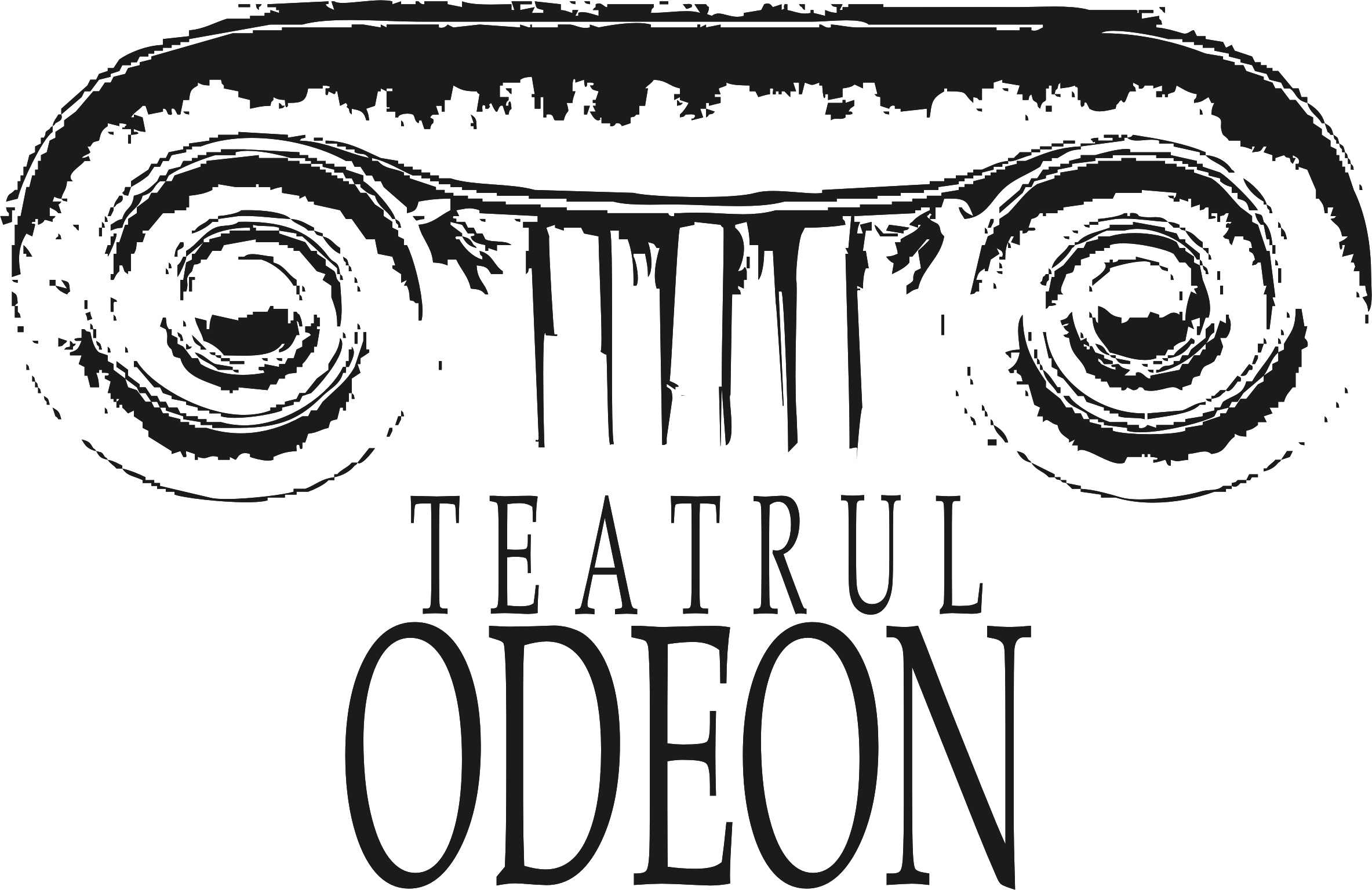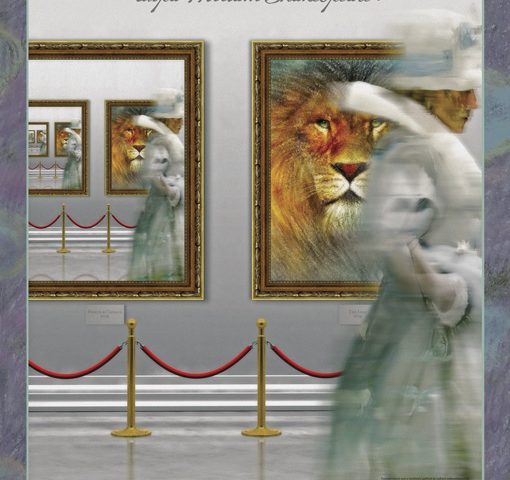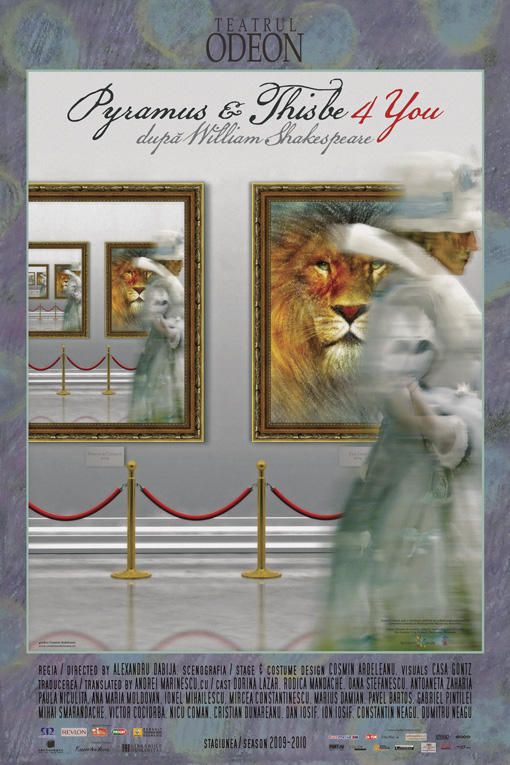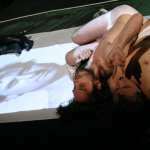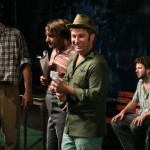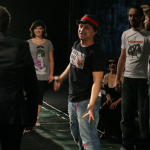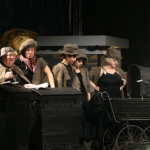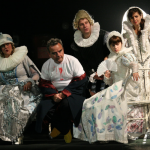based on William Shakespeare, directed by Alexandru Dabija
1.
Prologue Mircea Constantinescu
Quince Dorina Lazăr
Nicoleta Fundoianu / Bottom – Pyramus: Oana Ștefănescu
Francesca Pitigoi / Flute – Thisbe: Antoaneta Zaharia / Ada Simionică
Snug – Leul: Ana Maria Moldovan
Snout – Zidul: Paula Niculiţă
Starvelling – Luna: Rodica Mandache
Theseus: Mihai Smarandache
Hippolyta: Marius Damian
Egeus: Pavel Bartoş
2.
Gutman / Quince: Ionel Mihăilescu
Nicu Fundoianu / Bottom – Pyramus: Marius Damian
Francisc Cucu / Flute – Thisbe: Mihai Smarandache
Snug – Leul: Rodica Mandache
Toma Nanau / Snout – Zidul: Ana Maria Moldovan
Starvelling – Luna: Gabriel Pintilei
Theseus: Mircea Constantinescu
Egeus: Oana Ștefănescu
Hippolyta: Paula Niculiţă
The lovers: Antoaneta Zaharia / Ada Simionică / Pavel Bartoş
3.
Quince: Marius Damian
Fennek / Bottom – Pyramus: Pavel Bartoş
Flute – Thisbe: Rodica Mandache
Snug – Leul: Gabriel Pintilei
Snout – Zidul: Mihai Smarandache
Theseus: Mircea Constantinescu
Egeus: Oana Ștefănescu
Hippolyta: Paula Niculiţă
4.
Quince: Cristian Dunăreanu (props man)
Pyramus / Bottom: Victor Cociorba (stage handlers)
Thisbe / Flute: Dan Iosif (stage manager)
Snug: Nicu Coman (stage handler)
Snout: Constantin Neagu (stage handler)
Starveling: Dumitru Neagu (props man)
Prologue: Ion Iosif (stage handler)
Directed by: Alexandru Dabija
Stage design: Cosmin Ardeleanu
Visuals: Casa Gontz
Translated by: Andrei Marinescu
Festivalul Internațional de Teatru Miturile Cetății – Constanța, 25 iunie 2017
Zilele Elvirei Godeanu, Târgu-Jiu, 19 mai 2014
Turneu La Sofia, Bulgaria, 25 martie 2014
Festivalul Comediei, Braşov, 8 mai 2013
Festivalul Umorului “Constantin Tănase“, Vaslui, 10 octombrie 2012
Festivalul de Teatru Contemporan draMA, Odorheiu Secuiesc, 28 octombrie 2012
Festivalul Internaţional de Teatru de la Ruse, Bulgaria, 14 iunie 2012
Festivalul de Teatru de la Caracal, 3 mai 2012
Festivalul Internaţional de Teatru pentru Copii şi Tineret, Iaşi, 11 octombrie 2011
Festivalul de Teatru Scurt, Oradea, 27 septembrie 2011
Festivalul Internațional Shakespeare, București, 9 mai 2010
Festivalul Internațional de Teatru Interferențe de la Cluj, 7 decembrie 2010
Festivalul de Teatru EuroThalia de la Timișoara, 16 noiembrie 2010
Festivalul de Teatru de la Piatra Neamț, 24 octombrie 2010
Festivalul Național de Comedie de la Galați, 9 octombrie 2010
Festivalul Internațional de Teatru de la Alba Iulia, 29 septembrie 2010
Festivalul Internațional de Teatru de la Sibiu, 4 iunie 2010
Festivalul BITEI de la Chișinău, 23 mai 2010
Festivalul de Teatru de la Satu Mare, 19 mai 2010
Festivalul VedeTeatru de la Buzău, 16 mai 2010
Festivalul Internațional Shakespeare, București, 9 mai 2010
Turneu la Brașov, 25 februarie 2010
Festivalul de Teatru Clasic de la Arad, 13 octombrie 2009
Alexandru Dabija – Premiul Uniter pentru cea mai bună regie, 2010
Fotografii de Cosmin Ardeleanu
În această nouă producţie a Teatrului Odeon din Bucureşti, Alexandru Dabija, unul dintre cei mai dinamici regizori ai momentului, multiplică de patru ori clasica scenă de teatru în teatru din “Visul unei nopţi de vară”, celebra scenă a meşterilor. Fiecare versiune citeşte scena într-un registru diferit, parodiind mai multe tendinţe din teatrul contemporan din România. Prima dintre ele este jucată numai de femei. A doua intră în mediul artiştilor experimentali bigoţi. Cea de-a treia este o confruntare între un actor maghiar şi o mână de moldoveni plictisiţi, în timp ce ultima aduce pentru prima dată pe scenă, chiar tehnicienii teatrului. În traducerea/ adaptarea nouă şi originală a lui Andrei Marinescu, spectacolul este fabulos de amuzant, incapabil de a se lua în serios, vorbind despre deficienţele teatrului şi ale practicanţilor săi. Deşi Dabija, perfect urmat de actori, foloseşte în mod deschis tehnici de teatru şi chiar le supraexploatează, aluziile la anumite practici artistice nu fac spectacolul inaccesibil publicului obişnuit. Limbajul este folosit foarte simplu, construcţia dramatică se ocupă de toate detaliile, evitându-se pericolul repetiţiei. Dabija este binecunoscut pentru felul lui subtil de a evita clişeele şi de a-şi surprinde publicul. Spectacolul de la Odeon este inteligent şi plin de ironie înţepătoare.
